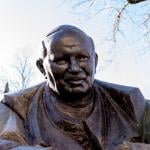THE QUESTION;
Did Jesus Exist?
THE RELIGION GUY’S ANSWER:
Yes.
It would be the ultimate blow to the Christian religion if Jesus, and with him the entirety of the New Testament, is totally fictional The strong consensus among historians, including non-Christians and skeptics, is that, yes. Jesus was an actual person of the 1st Century (Anno Domini!!). Yet an Ipsos poll for the Episcopal Church, released last month, showed only 76% of Americans “believe in the historical existence” of Jesus, with 89% of self-identified Christians, 43% for adherents of other religions, and 38% among the non-religious.
Among scholars, across the years certain “mythicists” have contended that he never existed. University of North Carolina Professor Bart Ehrman, author of “Did Jesus Exist?” (2012) and rather skeptical himself, knows of only one such thinker among thousands of scholars with Ph.D. degrees who are working in the New Testament field. He’s Robert Price, a onetime Baptist minister, member of the radical “Jesus Seminar,” and author of “The Historical Bejeezus” who teaches at Johnnie Coleman Theological Seminary, a “New Thought” school.
Other mythicists have included Frank Zindler, a science educator, Jesus Seminar participant, and an editor with American Atheists. In 1970, Doubleday published an eccentric book by Britain’s John M. Allegro, who thought there never was a Jesus and Christianity originated as a drug cult. John Remsburg, a 19th Century superintendent of public instruction for Kansas, backed mythicism by listing 42 ancient authors never wrote about Jesus. (A newsman like The Guy would figure that’s what you’d expect with an itinerant teacher executed as a criminal in a backwater of the Roman Empire.)
But Remsburg raised an interesting question. Let’s say for the sake of argument we totally exclude the New Testament as evidence (which historians would never do in judging the existence of other figures from ancient times). Do we have any other relevant documentation? Yes, though it’s sketchy. The following draws from “Jesus and Christian Origins Outside the New Testament” by F.F. Bruce of England’s University of Manchester. (Yes, he was a Christian who also wrote the related and relevant “The New Testament Documents: Are They Reliable?”}
Start with the Annals (xv, 44) by the Roman historian Tacitus, written in A.D. 115-117 a century after Jesus’ career. He notes the Emperor Nero tried to blame the ruinous Rome fire of A.D. 64 on the Christians, a group Tacitus says “got their name from Christ, who was executed by sentence of the procurator Pontius Pilate in the reign of Tiberius. That checked the pernicious superstation for a short time but it broke out afresh, not only in Judea where the plague first arose but in Rome itself. . .”
Seem familiar?
Another Roman historian in that era, Suetonius, wrote in Claudius (25, 4) that this emperor “expelled the Jews from Rome, on account of riots in which they were constantly indulging at the instigation of Chrestus.” (Bruce said that was a common misspelling of “Christ”.)
We also have a letter (Epistles, x, 33-34, 96-97) from that time frame by Pliny the Younger, the empire’s legate over a sector of present-day Turkey. He wrote to the Emperor Trajan about executing those who believed in “Christ” if they refused to recant. Pliny reported that these people would meet “on a fixed day, before sunrise,” took “oaths” of moral behavior, and would together eat food of “an ordinary and innocent kind.”
(A timely side note, since Roman Catholics and Southern Baptists are currently discussing whether women should be deacons. Pliny noted the torture of “two female slaves who were called ‘deacons’.” They are the first Christian martyrs to be mentioned in texts after the New Testament period.)
We’ll bypass a possibly relevant letter of Mara bar Serapion to his son, which does not mention Jesus Christ by name and has an uncertain date of composition.
The great 1st Century Jewish historian Josephus is obviously important, but problematic. Josephus mentions the New Testament figures John the Baptist and Jesus’s brother James, and turns to Jesus himself in Jewish Antiquities (xviii), written about A.D. 93
“There was about this time Jesus, a wise man, if it be lawful to call him a man, for he was a doer of wonderful works, a teacher of such men as receive the truth with pleasure. He drew over to him both many of the Jews, and many of the Gentiles. He was the Christ.” The text than says Pilate condemned him to the cross but “he appeared to them alive again at the third day.”
Bruce thought this showed obvious tampering with the text by a later Christian believer. But he concluded that the original version most likely verified Jesus’ reputation as a miracle-worker, his crucifixion under Pilate, Jewish objections to claims he was the Messiah, and that he was the founder of the Christian movement. There’s a similar problem of tampering with the material about Jesus in Josephus’ Jewish War (ii).
In The Death of Peregrine ((11-13) by the 2nd Century Greek satirist Lucian, the Christians are said to “worship a man to this day, the distinguished personage who introduced their novel rites and was crucified on that account.” Further, it was “impressed on them by their original lawgiver that they are all brothers, from the moment that they are converted and deny the gods of Greece and worship the crucified sage and live after his laws.”
The Talmud, Judaism’s authoritative commentary on the Scriptures, rarely mentions historical events, which makes one passage in the Mishnah, prior traditions compiled around the year 200, of particular interest. The tractate Sanhedrin (43a), recalls that “Jesus was hanged on Passover Eve” because he practiced “sorcery and led Israel astray and enticed them into apostasy.”
We thus have ancient non-Christian and anti-Christian writers who provide single, double, or triple attestation of basic details about the Jesus Christ who is portrayed in full in the New Testament.












